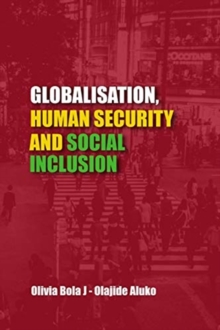The groundwork for this volume was laid during a presentation I gave titled 'Migration as a security threat' at the 4th Diaspora International Conference organised by the World Association of Sustainable development (WASD) in the UK.
Thus, this work is a contribution to a large body of literature on migration studies throughout the whole world. The process of writing this book has come at a time when a spotlight has been placed on immigration as a growing danger to national security.
In the past decade, influxes of migrants into the UK have generated new challenges of balancing national security with human security for nation states, as a consequence of which apathy and antipathy towards newcomers is becoming a widespread issue, with many international communities slamming their doors on further immigration.
Globalisation has opened avenues for goods and services to be exchanged between countries, thus increasing the tradability of skills and service-oriented activities. With increasing opportunities for jobs in certain sectors in the UK, it has sometimes been relatively easy for migrants to enter and work in the UK, as they have helped fill shortages in many areas of need, such as in the National Health Service (NHS).
However, this situation has created new challenges for international communities, as countries struggle to balance economic growth with unease over outsiders.
The expansion in commerce driven by globalisation has greatly benefited the UK economy; however, recent issues associated with Brexit have caused uncertainties concerning the future of trade, and one will not know to what extent that this process fully impacts the economy until after the deals with the European Union (EU) are concluded.The Brexit vote was largely driven by the British public's fears about mass immigration from Europe, and one of the major reasons for the European Union (EU) referendum of 23 June 2016 was to 'reclaim' British borders.
Voters hope that Brexit will curtail free movement from the EU, which the government has said is on sustainable levels. An abiding concern has been that standards of living might fall due to rising challenges to British natives in the labour market if the mass population of migrants and refugees are allowed into the UK. Thus, many have deduced that the primary reason why 17.4 million Britons voted to leave the EU was to reduce immigration and its perceived threat to social and economic structures here in the UK.
Others have argued that the real problems of immigration originate not with the EU migrants, but rather with those from outside the Eurozone.
Approximately 184,000 migrants arrived in the UK from the EU in 2015, whereas some 188,000 migrants entered from non-EU countries over the same period (Arnheim, 2017).
With "Immigration" being a major consideration in "Brexit", there is a need to carefully document the history of how people from other parts of the world have settled in Britain and the opportunities and challenges they have encountered in their settlement.Abiodun AlaoProfessor of African Studies, King's College London, Strand, London.This well-written volume provides coverage of a number of critical issues not commonly covered in studies of migration and immigration.
There is a majority perception that migrants have travelled to the new countries to become 'spongers' who bring little or no added value to their new communities, the effect of which has been the creation of a range of barriers that prevent the new immigrant from settling into such societies. It is heartening to see how Olivia's book describes some of these barriers and refutes the perceptions underlying them. 'Lade Olugbemi, Convener The NOUS Organisation Ltd. www.nousorganisation.com

